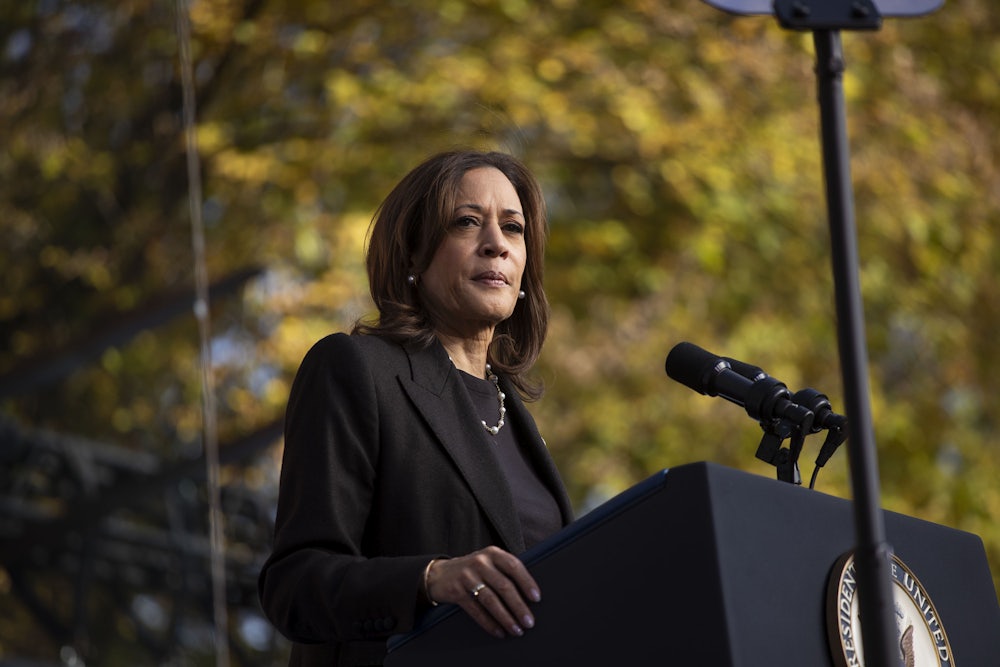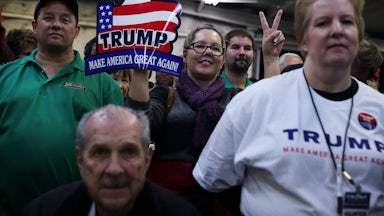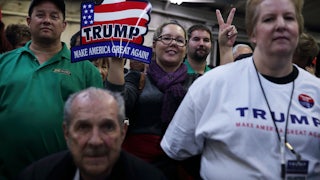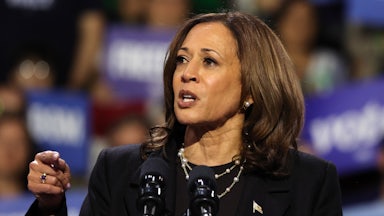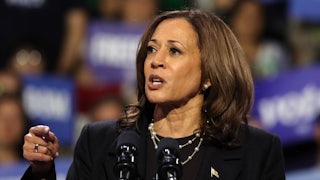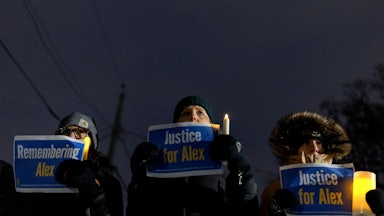Kamala Harris is crushing Donald Trump among voters aged 18 to 34, according to a new CNBC/Generation Lab poll, with 60 percent favoring Harris over 40 percent favoring Trump. This is significant because, although candidate Joe Biden carried young voters by roughly the same margin in 2020, according to the Pew Research Center, his grip on the youth vote was slipping away last spring. As recently as July, the CNBC/Generation Lab poll put Harris’s lead among this cohort at a shakier 46 to 34 percent. Now it looks like Harris has recaptured the 20-point lead that Biden enjoyed in 2020.
This is excellent news. But the bigger news these days is that Kamala Harris may recapture the over-65 vote, a much larger bloc that hasn’t gone Democratic for a generation. We may end up remembering 2024 as the year the gerontocracy voted itself out of office.
Think about it. The Democratic nominee, who’ll be 82 next month, got replaced for being too old largely through the efforts of a still-powerful former House speaker, aged 84. The Republican nominee, aged 78, came to power largely on the strength of his elderly support; foolishly sabotaged that support in 2020 by telling his supporters not to vote by mail, which old people do more than anyone else; and now is struggling to hang onto that support by promising not to tax Social Security benefits. The replacement Democratic nominee is a relative youngster who celebrated her 60th birthday earlier this week. Yet it’s this—well, let’s say relatively youthful—politician who may ascend to the White House on the strength of the elderly vote.
The chattering class is forever fascinated by the youth vote because young people are our future, etc., and there are a lot of polling organizations that track it. These include Generation Lab (founded by Cyrus Beschloss, under-30 son of the historian Michael Beschloss); the Harvard Youth poll (which in September recorded an even larger 30-point lead for Harris among likely voters); the Yale Youth Poll (which earlier this month put Harris’s lead at 22 points among likely voters); and the University of Chicago/Generation Forward Youth Poll (which in August had Harris leading Trump by nine points). Universities in particular have a bias for studying the youth vote because they’re heavily populated by young people, to whom the views of other young people are inherently more fascinating than the views of everybody else.
But what we really need is better polling about older voters. I’m not aware that any entity besides the AARP polls the alte kaker vote on a regular basis, and the AARP’s polls seldom make headlines. Look, I get it. As the British playwright Alan Bennett observes ruefully in his 2018 play Allelujah, “Nobody likes old people. Even old people don’t like old people.” But ignore this group at your peril, because just about the last faculty Americans lose before they depart this vale of tears is the ability to fill out a ballot.
In 2020, turnout for eligible voters aged 65 and older was 72 percent, higher than for any other age group. Old people’s greater propensity to vote, combined with the aging of the population, conspired to make over-65s the largest single age-based voting bloc in the 2022 midterms, constituting one-third of the total. Voters over 50 were 64 percent of the total. The much-studied under-30s were a mere 10 percent. In the 2020 election the percentages were only slightly less skewed upward (over-65s were 26 percent and under-30s were 16 percent). In elections, the elderly voter is king. As Mrs. Loman says in Death of a Salesman, attention must be paid to such a person.
So let’s pay attention. In 2020 Biden lost the over-65s by only three percentage points, 48–51. This was a huge advance. Hillary Clinton had lost this cohort by 9 percentage points in 2016, and President Barack Obama had lost them by six percentage points in 2012. Why the shift? I chalked it up to Trump’s self-destructive opposition to mail-in ballots and to Biden being, well, older.
Older voters have enabled our aging government. In a 2019 essay, I attributed America’s turning into a crabby gerontocracy to the growing power of the elderly vote. Our top political leaders, I noted, were a full six years older than the geriatric Soviet Politburo at which we used to guffaw. Older voters, I pointed out, were less concerned than their younger counterparts about racial discrimination, less enthusiastic about immigration, and less wrapped around the axle about climate change. Tellingly, they were also less capable of distinguishing fact from opinion. Too much Fox News! (Before you call me ageist, please note that I myself am 66.)
In sum, older voters are more conservative than younger voters, which is why over-65s have gone Republican in every election since 2000. But when stories started appearing last spring that some polls showed over-65s actually favoring Biden over Trump, I began to take this shift more seriously. Part of this change, apparently, is that the World War Two (“Greatest”) Generation and the Silent Generation of the 1950s are dying off, leaving behind a baby boom generation that, while more conservative than younger cohorts, is less conservative than its elders were (at least partly because it’s less white).
But part of it also appears to be that if you’re “conservative” in the sense of not favoring the capricious destruction of existing American institutions and norms—that is to say, if you’re a Liz Cheney sort of conservative—then, assuming you’re at all reflective, you won’t be able to stomach a felon who babbles about Arnold Palmer’s penis, announces publicly his intention to ignore the Constitution, and says, “So what?” when informed that a mob is trying to lynch his vice president.
Initially, Harris slipped among over-65s, with a New YorkTimes/Siena likely-voter poll showing her losing this group by six percentage points last month, 46–52. But a follow-up poll earlier this month showed her leading Trump with over-65s, 49–47 percent. Michael Baharaeen reported Monday in The Liberal Patriot (citing crosstab averages from the Cook Political Report that I can’t get to because I don’t subscribe) that Harris still trails Trump with over-65s, but only by 1.4 percentage points.
These numbers probably reflect movement among older women. The Republican pollster Kristen Soltis Anderson last week told Amanda Becker of 19thNews.org that among age cohorts, “the biggest movement, far and away,” has been among women aged 50 and over. Since January, they’ve gone from favoring Biden over Trump by three percentage points to favoring Harris over Trump by 12 percentage points. Their male counterparts, Anderson said, continue to favor Trump by roughly the same margin that they did in January. Happily, older women are likelier than older men to show up at the polls. “There are 63 million women voters over the age of 50,” AARP executive vice president Nancy LeaMond told Becker, “and about 97 percent of them say they’re going to vote.”
Can AARP-eligible women deliver the presidency to Harris? We’ll see. But with Trump squandering the Republican Party’s natural advantage, the gerontocracy may decide the election in Harris’s favor—and in doing so, begin the overdue process of passing the torch to a new generation.
